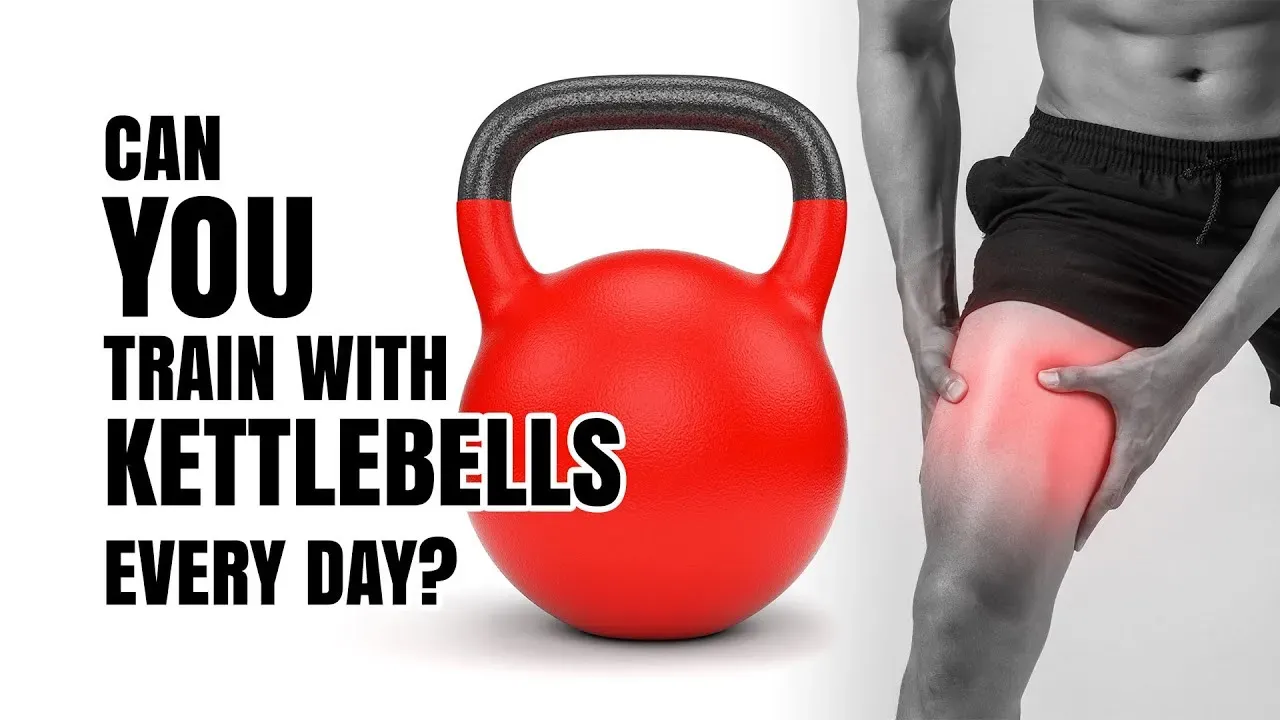Table of Contents
So, you've got a kettlebell, maybe you've been swinging it around a bit, and now you're wondering:can you do kettlebell workouts everyday? It’s a fair question. The idea of consistent daily training sounds appealing, like a fast track to fitness glory. Imagine the gains, the calories burned, the sheer discipline of it all. But hang on a second. Before you dive headfirst into a daily kettlebell grind, let's pump the brakes. Fitness isn't just about putting in work; it's about smart work and, frankly, not breaking yourself. Training every single day, especially with a tool as demanding as a kettlebell, involves more than just showing up. We need to talk about what 'everyday' even means in this context, your body's not-so-subtle demands for rest, and whether your goals actually line up with such a relentless schedule. This article isn't just going to give you a simple yes or no; it's going to walk you through the actual considerations that matter before you commit to daily kettlebell training.
Can You Do Kettlebell Workouts Everyday? It Depends

Can You Do Kettlebell Workouts Everyday? It Depends
The Appeal vs. The Reality of Daily Kettlebells
Alright, let's cut to the chase. You're probably here because you've seen someone online swinging a kettlebell like a pro every single day or maybe you just love the feeling it gives you.
The idea of consistent, daily progress with a single, powerful tool is incredibly tempting.
You might think, "If I just do this every day, I'll get strong, lean, and unstoppable."
And hey, that kind of dedication is admirable.
But when someone asks me point-blank, "Can You Do Kettlebell Workouts Everyday? It Depends."
That's my immediate, honest answer.
It's not a cop-out.
It's the truth rooted in how bodies actually adapt and recover, not in hyped-up social media feeds.
Treating the kettlebell as a magic bullet you can just hammer away with daily without thought is a fast track to burnout or injury.
Why "It Depends" Isn't Just a Vague Answer
So, what exactly does it depend on?
It's not one thing; it's a cocktail of factors unique to you.
Your current fitness level is a big one.
Are you new to kettlebells, or have you been training for years?
The intensity and type of workout matter hugely.
Are you doing heavy swings and snatches, or lighter, more mobility-focused work?
Then there's the crucial, often ignored, piece: recovery.
How well are you sleeping?
What are you eating?
How stressed are you from work or life?
All these play a massive role in whether your body can handle daily demands.
Ignoring these means you're not training; you're just digging a hole.
- Your current fitness level
- The intensity of the workouts
- Specific exercises performed (grinds vs. ballistics)
- Quality of sleep
- Nutritional intake
- Overall stress levels
- Training goals
Adapting Your Approach for Potential Daily Training
Does "it depends" mean never?
Not necessarily.
It means you can't just pick a random kettlebell workout online and do it seven days a week and expect good results.
You might be able to train daily if you structure your week intelligently.
This could involve alternating heavy days with very light, recovery-focused days.
Maybe one day is dedicated to low-intensity movement and mobility with a light bell.
Another might be short, sharp bursts of high-intensity swings.
Then perhaps a day of technical practice with lighter weight.
It requires a smart program design, not just enthusiasm.
It's about listening to your body and being willing to back off when needed.
Beyond the Swing: Why Recovery Impacts Daily Kettlebells

Beyond the Swing: Why Recovery Impacts Daily Kettlebells
The Unseen Work: What Happens When You Stop Swinging?
Look, the kettlebell swing gets all the glory. It's dynamic, powerful, and just feels effective. But what happens *after* the last swing, the last clean, the last press? That's where the real magic, or lack thereof, happens. Recovery isn't just lying on the couch scrolling through your phone, although rest is part of it. It's a complex biological process where your muscles repair the tiny tears created by training, your nervous system calms down, and your energy stores get refilled. Skipping this crucial phase because you're eager to answer "yes" tocan you do kettlebell workouts everydayis like trying to build a house without letting the foundation set. You might put up some walls, but the whole thing is unstable and likely to crumble.
Ignoring Recovery: The Express Train to Overtraining
Think of your body like a battery. Every workout drains it a bit. Sleep, nutrition, and rest recharge it. If you're hitting it with demanding kettlebell work every single day without adequate recovery, you're constantly draining the battery without giving it a full charge. This leads down a dark road: chronic fatigue, decreased performance, increased risk of injury, and a general feeling of 'blah'. Your strength might plateau or even decrease. Those satisfying workouts become a chore. You might even get sick more often because your immune system is stressed. It's the classic case of doing more but achieving less, a common trap for the overly enthusiastic.
Signs You Might Be Skimping on Recovery:
- Persistent muscle soreness that doesn't go away
- Feeling constantly tired, even after sleep
- Decreased performance in your workouts
- Increased irritability or mood swings
- Trouble sleeping
- Loss of motivation to train
- Frequent minor illnesses (colds, etc.)
- Elevated resting heart rate
Smart Programming: Crafting Daily Kettlebell Workouts That Work

Smart Programming: Crafting Daily Kettlebell Workouts That Work
Smart Programming: Crafting Daily Kettlebell Workouts That Work
so if the answer tocan you do kettlebell workouts everydayisn't a hard "absolutely not," then how the heck do people actually make it work without dissolving into a puddle of fatigue? The secret sauce isn't just doing *a* kettlebell workout daily; it's doing the *right* kettlebell workout daily, which means smart programming. You can't just repeat the same brutal session seven times a week. That's a recipe for disaster, not progress. Instead, think of your week as a menu with different dishes. Some days might be light and focused purely on technique or low-intensity movement, like practicing perfect swings with a feather-light bell or doing some gentle mobility work. Other days could be short, sharp efforts with ballistic movements like snatches or cleans, keeping the total volume low but the intensity high. Then you might have a day dedicated to slower, strength-focused "grind" exercises like presses or squats, perhaps with heavier weight but lower reps. It's about varying the stimulus, managing fatigue, and strategically placing recovery within the training week itself, even if you're technically touching a kettlebell every day.
The Risks of Pushing Too Hard: Can You Do Kettlebell Workouts Everyday Without Burnout?

The Risks of Pushing Too Hard: Can You Do Kettlebell Workouts Everyday Without Burnout?
Ignoring the Signals: Injury is Not a Medal of Honor
Look, the human body is remarkably resilient, but it's not indestructible, especially when you're repeatedly loading joints and tissues with dynamic movements like kettlebell swings or snatches. Trying to train every single day without proper recovery is like driving your car with the check engine light permanently on. Eventually, something is going to give. We're talking about increased risk of tendonitis in elbows and shoulders, lower back pain from fatigued core muscles, wrist issues from poor racking positions under duress, or even stress fractures if you're doing high-impact ballistics constantly. Pushing through pain isn't tough; it's usually just dumb. That little twinge you feel today? Ignore it while doing 100 more swings, and it could be a full-blown injury sidelining you for weeks or months. Consistency is key in fitness, yes, but consistency in breaking yourself is just self-sabotage.
The Mental Grind: When Passion Turns to Pure Pain
Beyond the physical breakdown, there's the often-overlooked mental toll. What starts as an exciting daily challenge – "Yes,can you do kettlebell workouts everyday? I'll show you!" – can quickly devolve into soul-crushing obligation. Overtraining doesn't just make your muscles tired; it taxes your central nervous system. This can manifest as irritability, anxiety, difficulty concentrating, and a complete loss of motivation. Remember how much you loved picking up that bell? Now it feels like a heavy chore you dread. That's burnout setting in. It strips away the joy of training and can make you want to quit entirely. It's a high price to pay for chasing an unsustainable daily goal.
Potential Downsides of Daily Kettlebell Training Without Proper Planning:
- Increased risk of acute injuries (strains, sprains)
- Development of chronic overuse issues (tendonitis, joint pain)
- Decreased performance and strength plateaus
- Chronic fatigue and lethargy
- Elevated stress hormones
- Impaired immune function
- Significant loss of training motivation (burnout)
- Disrupted sleep patterns
- Increased irritability and mood disturbances
Is Daily Right for You? Finding Your Kettlebell Training Frequency

Is Daily Right for You? Finding Your Kettlebell Training Frequency
Finding Your Sweet Spot: More Isn't Always Better
Is Daily Right for You? Finding Your Kettlebell Training Frequencyultimately boils down to a cold, hard look in the mirror, not just at your muscles, but at your entire life. Forget what the internet guru with perfect genetics and unlimited free time is doing. Are you sleeping seven to nine hours? Is your diet supporting recovery? Is your job or family life adding significant stress? If the answer to any of those is a shaky "maybe" or a definite "no," then training heavy with a kettlebell every single day is likely a terrible idea. For most people, consistency is far more valuable than frequency. Hitting two or three focused, quality sessions a week where you can push hard and then *actually recover* will yield better results in the long run than grinding through seven mediocre, fatigue-laden workouts that leave you feeling perpetually run down. The goal isn't to accumulate the most training days; it's to accumulate the most effective training and recovery cycles.
So, Can You Do Kettlebell Workouts Everyday?
Look, if you came here hoping for a simple "yes, absolutely, go crush it!" then you're probably disappointed. The short, honest answer tocan you do kettlebell workouts everydayis: maybe, but probably not how you're imagining it. It's not about hitting beast mode with heavy swings and snatches 365 days a year. It's about context – your recovery, your actual fitness level, what you're trying to achieve, and how smart your programming is. Pushing too hard, too often, without listening to your body, is a fast track to injury or burnout, not peak fitness. Think of the kettlebell as a powerful tool, not a daily hammer for everything. Use it wisely, prioritize rest just as much as the work, and figure out what frequency actually supports your goals and keeps you in the game for the long haul. Sometimes, less is genuinely more.